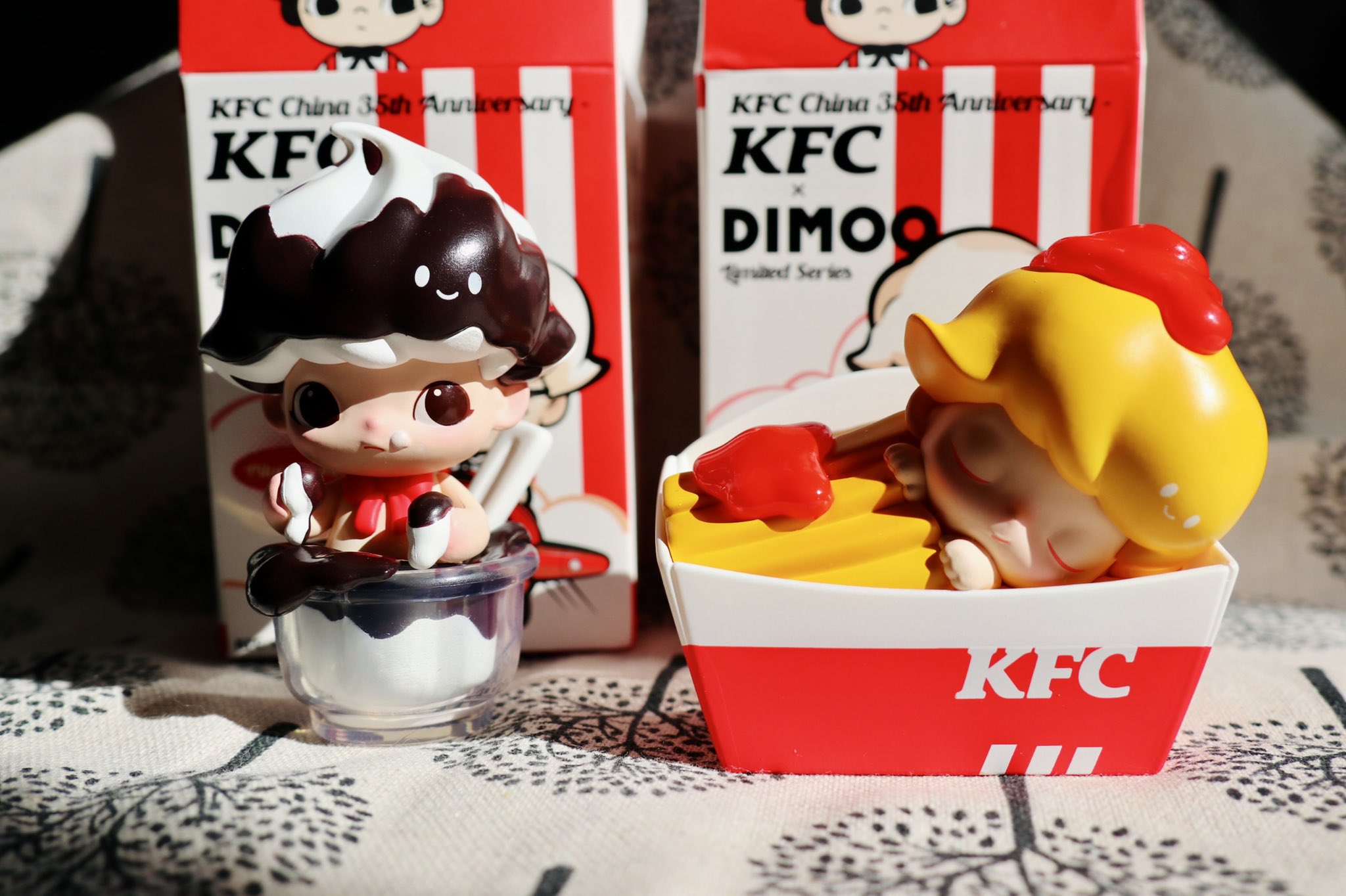KFC faces regulatory heat after scalpers drive up price of limited-edition collectibles
Fried chicken and collectible mystery dolls — what could go wrong with a collaboration between KFC and Pop Mart? A lot, as it turns out.

A collaboration between the Chinese unit of fast-food chain KFC and trendy Chinese toy maker Pop Mart, which involves a set of collectible figurines that come with meal purchases, has come under scrutiny as scalpers jumped on the opportunity to rip off real fans, prompting concerns from Chinese regulators about irrational buying and food waste.
The promotion was launched by the restaurant last week as part of its celebration of the 35th anniversary of its first store in China. In partnership with Pop Mart, a multibillion-dollar company known for selling collectible toys packaged in mystery “blind boxes,” KFC introduced seven special editions of Pop Mart’s popular Dimoo dolls. Dressed up as various items from KFC’s menu, the plastic dolls are bundled randomly with its family bundle meals, which are priced at 99 yuan ($15.6) and can feed two to four people.
As one of Pop Mart’s signature products, Dimoo dolls are a hot commodity among avid collectors. Controversies have emerged in the past when zealous fans complained about scalping and the gambling nature of the toy manufacturer’s business model.
So naturally, it didn’t take long for the excitement surrounding the collaboration to turn into a frenzy. Collectors and scalpers bought the meals in large quantities in the hopes of getting all the dolls. The scalpers purchased the meals in bulk just to resell the dolls on third-party ecommerce platforms, wasting the food in the process.
Meanwhile, casual collectors complained on social media that the meals were sold out everywhere and their orders online were mysteriously canceled when they arrived at restaurants to pick up the food. Others suspected that some scalpers bought the toys behind the scenes from KFC employees before they hit the market.
According to the Beijing Youth Daily (in Chinese), on Xianyu, Alibaba’s used-goods online marketplace, there were hundreds of vendors selling the dolls. Full sets were priced between 600 yuan ($94) and 800 yuan ($126), with some of the rarest items being sold at 800 yuan ($126) individually — roughly eight times the price of a single “family bundle” meal.
China news, weekly.
Sign up for The China Project’s weekly newsletter, our free roundup of the most important China stories.
On Wednesday, the craze became so intense that Chinese authorities felt the need to weigh in. In an article (in Chinese) published today on its official website, the Chinese Consumers Association (CCA) called for a boycott of KFC, saying that the promotion was an affront to “public order and good customs” because it “seduced consumers into irrational and excessive buying.” In one example, the associations said, a consumer spent 10,494 yuan ($1,650) to buy 106 family meals at one go to collect the toys.
Citing China’s anti-food-waste law, which went into effect in April 2021 following a nationwide campaign encouraging people to waste less food and embrace a frugal lifestyle, the association also criticized KFC for violating “the spirit of the law,” urging it to fulfill its social responsibility as a food operator.
However, CCA’s tirade didn’t seem to slow the promotion down. As The Paper noted today (in Chinese), customer service at KFC confirmed that there were no internal orders to halt the campaign, which is scheduled to conclude at the end of this week.
Founded in 2010 by then 23-year-old CEO Wáng Níng 王宁, Pop Mart started as a retailer of lifestyle commodities, including toys, home goods, and beauty products. In 2014, the company overhauled its offering of products and pivoted to a niche business: selling “mystery boxes”: collectible figurines in packaging that doesn’t allow buyers to see what’s inside, a concept similar to gashapon vending machines in Japan.
Pop Mart’s products quickly took off among young Chinese people looking for cheap, novel forms of entertainment and online shopping. In its initial public offering in 2020, Pop Mart raised $676 million on the Hong Kong Stock Exchange, which gave the firm a valuation of $7 billion ahead of the trading debut.
The success of Pop Mart has also inspired a slew of businesses hoping to seize on the mystery box craze, but some of them have exposed the dark side of the trend. In May last year, a group of animal welfare activists in Chengdu discovered hundreds of dogs and cats ready for shipping at a local logistics facility, bringing to light a market for so-called “blind-box pets” (宠物盲盒 chǒngwù mánghé), where vendors sold animals to people who had no idea what they would get when making their purchases. Recently, the concept also saw its application in the dating scene as hundreds of mini-apps emerged on WeChat that allowed strangers to exchange information in digital “blind boxes.” While some users praised the services as a “cheap but fun” way to date, experts warned of various risks involved, such as sexual harassment and financial fraud.
Pop Mart itself has been the subject of controversy for sexist questions in job interviews. But the latest KFC kerfuffle is unlikely to cause either Pop Mart or KFC any long term damage.






